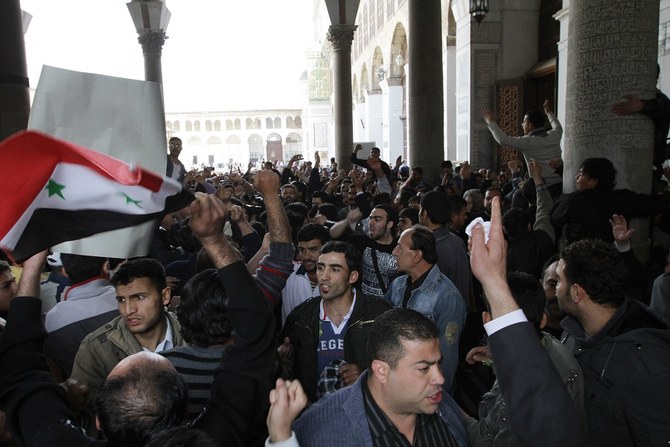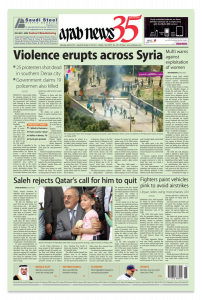- ARAB NEWS
- 30 Jun 2025

Sharif Nashashibi
SUMMARY:
The Syrian conflict blew wide open the sectarian and political faultlines that had to an extent been papered over by the region’s near-unanimous opposition to this century’s two previous watershed events in the Middle East: Israel’s increased oppression of the Palestinians, and the invasion and occupation of Iraq.
The Iraq folly cast a shadow over the Syrian conflict, with Iran able to fulfil its goal of becoming a regional hegemon, and the international community deeply reticent about foreign involvement in other countries, even when a government is butchering its own people.
That has enabled Syrian President Bashar Assad to carry out what the UN has described as crimes against humanity amounting to “extermination” of the civilian population. Meanwhile, American fatigue in Iraq and Afghanistan allowed a resurgent Russia to fill the US void in the Middle East. Moscow’s direct intervention in the Syrian conflict turned the tide in Assad’s favor.
LONDON: As Arab News looks back at 45 “moments of change” that the newspaper has covered during its history, including Syria on the list is a no-brainer. But to say the ongoing conflict there has changed the region is an understatement — Syria has defined the Middle East and beyond, and has contributed to the reshaping of the world order.
Sectarian and political faultlines had to an extent been papered over by the region’s near-unanimous opposition to this century’s two previous watershed events in the Middle East: Israel’s increased oppression of the Palestinians, and the invasion and occupation of Iraq. Syria blew those faultlines wide open.
The longevity and scale of the horrors that the Syrian people have faced for the last nine years can be attributed in large part to the consequences of the Iraq folly. The US-led invasion and occupation unleashed an Iran determined to be a regional hegemon, and the Syrian uprising presented Tehran with the opportunity to flex its newfound muscle to that end.
Furthermore, the calamitous US-led intervention in Iraq understandably made the international community deeply reticent about foreign involvement in other countries. But this reticence did not address what to do when a government is butchering its own people.
As such, the Iraq experience has provided an insurance policy for dictators and autocrats worldwide — as long as their brutality is kept within their own borders, they can enjoy immunity. That has enabled Syrian President Bashar Assad to carry out what the UN has described as crimes against humanity amounting to “extermination” of the civilian population, without any real fear of being held to account.
America’s fatigue with its seemingly endless wars in Iraq and Afghanistan allowed a resurgent Russia to fill the US void in the Middle East. Having positioned itself during the 1990s and 2000s as a leading opponent of American interventionism, Moscow is now doing all the things it had been criticizing the US for (and which it had done with equal vigor during the Cold War).
Without Russia’s direct intervention in the Syrian conflict, Assad would have been finished years ago. Meanwhile, his patron in Moscow has repeatedly shielded him from censure in the UN Security Council, as the US has done for Israel.
Security forces in the city of Deraa shoot dead protesters demanding the release of political prisoners, triggering nationwide demonstrations.

Daesh declares a “caliphate” in territory spanning Syria and Iraq.

Russian direct military intervention begins, turning the tide of the conflict in favor of the Syrian regime.

American troops withdraw from northern Syria, prompting Turkey to attack US Kurdish allies in the area.

Direct conflict begins between Turkish and Syrian regime forces following the regime’s offensive in Idlib province and the killing of Turkish troops.

The many injustices facing the Arab world over the decades — some imposed from outside, others fostered from within — led to vibrant and determined movements that campaigned for self-determination, human rights, justice, equality and international law. Those movements provided hope to counterbalance despair and disillusionment. The Syrian conflict snuffed out that hope.
Activists who had joined those movements out of principle realized that many of their peers were motivated instead by agenda. Many activists, journalists, parties and governments that cheered the removal of pro-Western dictators at the outset of the Arab Spring suddenly found all manner of excuses to support the one in Damascus. To them, Syrians are less deserving of basic human rights because they do not fit into a certain worldview.

“Human rights activists and witnesses said Syrian security forces opened fire on tens of thousands of protesters in Deraa, killing 25 and wounding hundreds.”
Wire story on Arab News front page, March 16, 2011
Worse, their popular struggle to secure those rights has been met with contempt and deception. Assad and his supporters are using the Israeli propaganda playbook. Meanwhile, the global political left, which had historically positioned itself as a champion of human rights and an opponent of imperialism, is full of people for whom rights are selective, and for whom only the West is capable of imperialism.
The invasion of Iraq was opposed worldwide, but there was no illusion of Saddam Hussein as being a benevolent or misunderstood leader. Yet Assad, who is no less brutal, is the subject of hero worship.
The “war on terror” narrative nurtured by him and his supporters — and copied from Israel and the US — has led to suspicion and demonization of millions of Syrian refugees fleeing to neighboring countries, Europe and further afield. The current rise of populism in Europe and elsewhere can be attributed in considerable measure to this anti-refugee sentiment.
Like the rest of the media, Arab News had to cover the conflict from beyond the actual warzone due to the inherent physical danger and because of access restrictions. Here too, the Assad regime took a leaf out of Israel’s and America’s book of war strategy: Deny access to a warzone, then dismiss all accounts, footage and citizen journalism from there as propaganda because it is unverified.

As an Arab proud of my heritage and privileged with freedoms that are denied to so many of my ethnic kin, my main motivation for becoming a journalist was to give a voice to Arabs silenced either by their own governments or by media bias and misrepresentation in the West.
Over the decades, there has been much cause for despair, but for me — as an Arab, a journalist and a proponent of universal human rights — what has happened in Syria has elevated that despair to a whole new level.
That country — historically known for its civilization, culture, hospitality, tolerance and diversity — is where the words “never again” have gone to die, buried under the rubble of a hospital or hanging from a regime torture cell as the rest of the world has either looked away or cheered on.